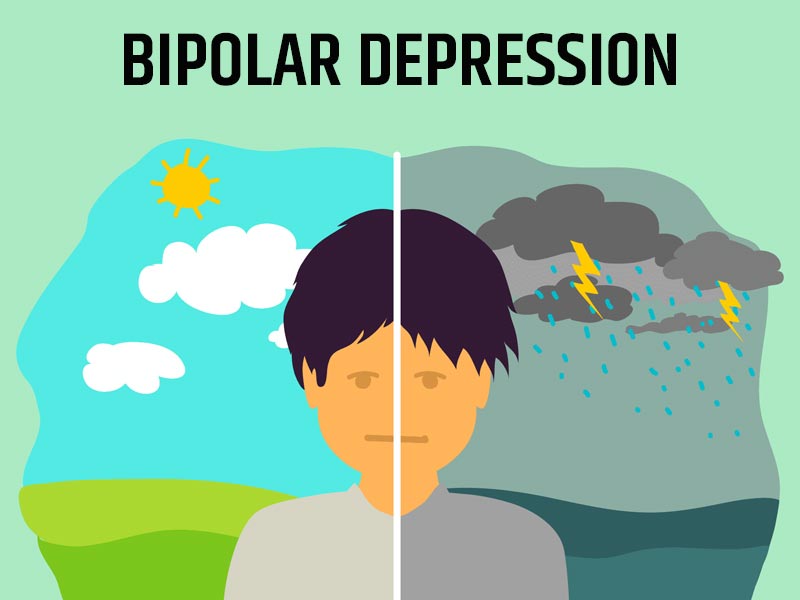
Bipolar disorder and depression are two types of mood disorders that have just some basic similarities. Bipolar disorder causes you to have varied emotions and have more high and lows whereas depression seeks to be in constant low. Depression is a common mood disorder that is suffered by thousands of people worldwide whereas bipolar disorder affects lesser number of people. However there is one condition in which a person can have symptoms of both the conditions at the same time. This disorder is called bipolar depression. Today we will try to understand the link between these two conditions and know symptoms of this mood disorder.
Table of Content:-
Depression and Bipolar Disorder
Both these disorder are meant to be two very different conditions. This is because one reveals a constant down mood whereas other finds changing extreme mood. People having depression usually one directions and one episode may last for almost 2 weeks. In Bipolar disorder, as the name suggests, has two opposite moods which occur simultaneously or in an interval.
What is Bipolar Depression?
Dr. Tanu Chowdhury, Clinical Psychologist from Healthcare Clinic, Lucknow explains that depressive episodes in bipolar disorder may look alike depression. If there is more than one maniac episode, then it distinguishes it from unipolar to bipolar depression. Bipolar depression is the condition where depressive episodes are more prominent than the other episode. This can happen due to various causes and mental health conditions. Bipolar depression has major depressing symptoms, let us have a look at these.
Also Read: Constant Mood Swings Can Lead To Bipolar Disorder, Know Symptoms, Causes and Treatment

Symptoms of Bipolar Depression
There are different types of depressive episodes that take place. Symptoms may vary in some episodes but are usually same for most of them.
- Having extreme sadness or guilt
- Feeling restlessness most of the time
- Having a feeling of hopelessness from within
- Loss of interest in the things and habits you loved to do
- Problem in focusing on activities and goals
- Movement becomes slower than usual
- Feeling more hungry that you would normally be
- Sudden weight gain or weight loss
- Decrease in sex drive and loss of intimacy in relationships
Bipolar Disorder Vs Bipolar Depression Symptoms

When you have bipolar disorder, your symptoms are also different. People having bipolar disorder tend to have high mood swings. They have too much going on their head and hence can be confused in their thoughts of action. They have more than normal energy whereas bipolar depression has very low. There is more irritability and sleepiness in case of bipolar disorder than depression.
Also Read: What Are The Different Types Of Depression?
Tips to Treat Bipolar Depression
1. Stick to a healthy schedule- bipolar depression can be controlled if the person works in the routine functions. You must eat, sleep and work on time in order to reduce the symptoms of bipolar depression.
2. Try to put everything in routine- Usually people suffering from bipolar depression do not have proper routine and they tend to be very lazy. Putting your day and dividing into proper structures can help reduce depressive symptoms which might cause frustration. Put an extra effort to go for medical appointments.
3. Do not be afraid to go out and explore- Bipolar depression leads the person to fear outside world and therefore he confines himself in a small space. If you do that, then the chances of depression may increase. Hence be fearless and try to face the world and enjoy your daily activities.

4. Stay Active- Researchers suggest that bipolar depression can be reduced just by making people more active in their lifestyle. This includes increasing your physical activities such as jogging, cycling, running and other activities. Moderate exercises are best to elevate symptoms of bipolar depression.
5. Do not isolate yourself- Isolation increases the depressive episodes and can worsen your mood disorder. If you find something overwhelming, then try to get involved and bring yourself out of confined zones. Isolation can increase the symptoms of depression and hence try to go to social gathering and talk to people around you. Be with someone you are more comfortable with and enjoy the company.
6. Find ideas to relieve stress- Stress is another factor that could create depressive episodes in bipolar depression. You need to be careful while choosing your activities. Try to find new ways of relieving stress such as massages, therapies, trekking, music, etc to reduce your stress levels. Stress can put episodes of depression to become more severe and lead to more complicated mental health disorders.
Picture Credits- istockimages.com
Also watch this video
How we keep this article up to date:
We work with experts and keep a close eye on the latest in health and wellness. Whenever there is a new research or helpful information, we update our articles with accurate and useful advice.
Current Version